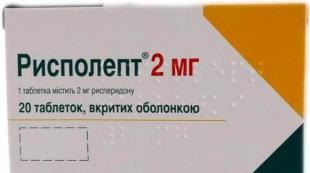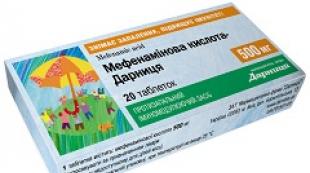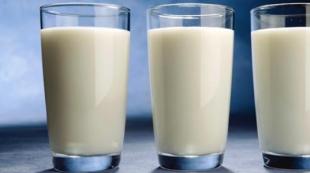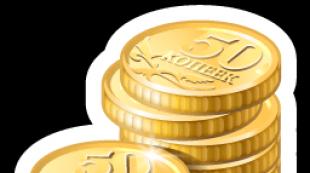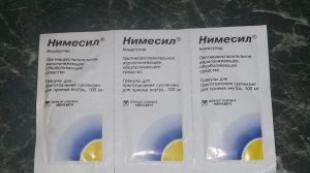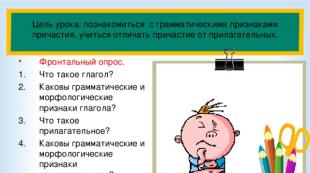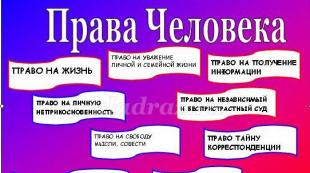What is good for the thyroid gland in hypothyroidism? List of prohibited products. Causes of hypothyroidism and its symptoms
Exists whole line pathologies arising due to the influence of factors such as lifestyle, dietary habits, level physical activity person, the ecological state of the environment in which he lives. These factors are adjustable. By eliminating the cause, a person often gets rid of the disease or significantly alleviates its course. These problems include, for example, hypothyroidism, a condition caused by impaired functioning of thyroid gland, and as a result, a deficiency of hormones - thyroxine and triiodothyronine. In iodine-deficient regions, symptoms of hypothyroidism are quite common. Experts are of the opinion that a diet for hypothyroidism and lifestyle correction are very effective for both prevention and treatment of the disease.
What is the diet based on?
Thyroid hormone deficiency can be due to several reasons, on the basis of which a list of products recommended for a given patient is compiled. A diet for hypothyroidism is effective if the symptoms of the disease are caused by the following reasons:
- insufficient intake of iodine into the body from food;
- insufficient protein intake;
- disruption or difficulty in the absorption of iodine by the body;
- insufficient functioning of the thyroid gland;
- resection of part of the thyroid gland.
The list of food products is developed by a doctor and may vary depending on metabolic characteristics, accompanying pathologies thyroid and others endocrine diseases. A diet for hypothyroidism involves including some foods in the diet and excluding others from the menu. At correct selection diet, the symptoms of the disease usually disappear.
Triiodothyronine and thyroxine (its precursor) are the most important thyroid hormones that regulate metabolism in the body, its growth and development. They are responsible for the metabolism of proteins, fats, vitamins, etc. Insufficient amounts of these hormones have a negative impact on overall health.
Proteins and iodine ions take part in the construction of hormone molecules. It is logical that for the normal synthesis of these biologically active compounds, a stable supply of protein, amino acids and iodine compounds to the body is necessary.
Nutrition for hypothyroidism caused by iodine deficiency
Many people, having noticed the symptoms of hypothyroidism, try to compensate for the lack of iodine in the body by taking specially developed biologically active additives containing iodine, vitamins. However, such treatment must be agreed upon with a doctor, because uncontrolled and unreasonable use of drugs can lead to problems of the opposite nature.
A more natural way for the body to replenish the deficiency of essential substances is to consume them with food. Iodine, which is part of food, is presented in organic form. In this form, it is absorbed better and more efficiently. Iodine is included in the following products: sea fish, shellfish, marine arthropods, seaweed (kelp), poultry, walnuts, sesame, pumpkin, cherries, apples, cranberries, prunes, bananas, strawberries, grapes, apricots, feijoa, persimmons, chokeberry, beets, carrots, tomatoes, garlic, corn (including canned), green bean, buckwheat, potatoes (baked), Jerusalem artichoke, dairy products, some types of cheese, eggs. Consumption of foods rich in iodine rarely threatens the development of thyrotoxicosis or an excess of the microelement, because the amount of iodine in them is relatively small. You can also fortify food with iodine by adding a large number of iodized salt.
Before including iodine-containing foods in your diet, you should consult your doctor. The specialist will prescribe tests, conduct an examination and identify the true level of hormones in the blood.
Diet for hypothyroidism caused by protein deficiency
 Protein is the main building material of our body. Its deficiency is expressed in the occurrence of pathologies at all levels, from the cellular to the systemic. A person’s health largely depends on the way he eats; it’s not for nothing that there is a saying: “We are what we eat.” When there is a protein deficiency, the first thing that suffers is hormonal regulation activity of the body.
Protein is the main building material of our body. Its deficiency is expressed in the occurrence of pathologies at all levels, from the cellular to the systemic. A person’s health largely depends on the way he eats; it’s not for nothing that there is a saying: “We are what we eat.” When there is a protein deficiency, the first thing that suffers is hormonal regulation activity of the body.
Hypothyroidism caused by insufficient protein intake is easy to reverse. All you have to do is start eating right and then hormonal background normalizes. Reduce the consumption of carbohydrate and fatty foods and enrich the diet with animal protein and plant origin, as well as fiber. Animal protein present in meat, fish, eggs, milk and dairy products. Plant protein rich in: legumes (beans, beans, lentils), cereals (buckwheat, pearl barley, oatmeal), nuts.
Nutrition for hypothyroidism caused by difficulty absorbing iodine
Most often, this phenomenon is due to the fact that our body receives elements that interfere with or impair the absorption of iodine. Iodine is a halogen; other halogens include bromine, chlorine, and fluorine. So, the listed microelements are also necessary for our body, but when they enter the body in quantities exceeding the norm, they compete with iodine in absorption. These elements bind to proteins faster and more easily and replace iodine in molecules.
Microelements such as fluorine and chlorine are usually included in drinking water. In some regions, the amount of one or another element is significantly overestimated. Bromine is found in some sedatives. Thus, to prevent the replacement of iodine in the body by other elements, it is necessary to drink purified or bottled water, and also not to abuse medications.
Dietary nutrition for hypothyroidism accompanied by pathological conditions of the thyroid gland
 In the vast majority of cases, hypothyroidism is associated with thyroid diseases. As a rule, compensatory growth of thyroid tissue occurs, and the appearance of neoplasms is also possible of various nature. In this case, doctors indicate a list of foods that need to be excluded from the diet or at least limit their consumption. Such products are called strumogens, and they cause the proliferation of thyroid tissue without directly affecting hormonal levels. These include: cauliflower, radish, turnip, radish, Jerusalem artichoke, spinach, beans, carrots, soybeans, peanuts, mango, peaches.
In the vast majority of cases, hypothyroidism is associated with thyroid diseases. As a rule, compensatory growth of thyroid tissue occurs, and the appearance of neoplasms is also possible of various nature. In this case, doctors indicate a list of foods that need to be excluded from the diet or at least limit their consumption. Such products are called strumogens, and they cause the proliferation of thyroid tissue without directly affecting hormonal levels. These include: cauliflower, radish, turnip, radish, Jerusalem artichoke, spinach, beans, carrots, soybeans, peanuts, mango, peaches.
For hypothyroidism caused by decreased secretory activity of the thyroid gland, it is recommended to drink natural coffe. This product perfectly stimulates the activity of the gland. Naturally, you should not abuse the drink, and you also need to know if there are any diseases for which coffee is contraindicated.
If the functioning of the thyroid gland is reduced, then it is undesirable to consume milk, dairy products with high content fats, foods high in fast carbohydrates, products made from soy protein, beer.
Basic rules of diet for hypothyroidism:
- Limit the amount of liquid you drink, because... Hypothyroidism causes tissue swelling.
- Avoid diets that focus on weight loss. Dietary restrictions will further slow down metabolic processes in the body.
- Eat foods containing a variety of vitamins, macro- and microelements.
- Monitor your cholesterol and blood sugar levels.
- Limit your intake salty foods, salt promotes water retention in the body.
Diet therapy is popular and quite effective method treatment. A proper, balanced and varied diet is often enough to improve your health and prevent the development of many diseases.
Hypothyroidism is a disease in which a person’s thyroid gland does not produce enough hormones. necessary for the body, because its correct operation depends on them.
One of the methods of treating this serious pathology is suitable and healthy eating.
What should be the diet for hypothyroidism? How to create the right menu that won't cause harm thyroid gland, but, on the contrary, will make her work easier.
Nutrition for hypothyroidism, and for any other disease, always plays an important and often fundamental role. Together with food, a person receives the nutrients, microelements and vitamins necessary for the proper functioning of the body.
Knowing the secrets rational nutrition and adhering to the principles of compilation correct menu, everyone will be able to prevent the development of many pathologies and maintain their health until old age.
Nowadays everyone faces hypothyroidism. more people, the number of people sick with it or having congenital pathology is constantly increasing.
IN Lately The age of the disease is also getting younger - even children turn to endocrinologists for problems with the functioning of the thyroid gland.
And if a person is diagnosed with hypothyroidism, then he must do everything possible to keep his body normal and control the disease. A properly composed menu will also help with this.
The basic principles of nutrition for hypothyroidism are as follows:
- eating only fresh products;
- correct heat treatment;
- increasing the amount of protein-containing foods;
- reduction and gradual elimination of the amount of simple carbohydrates;
- eating foods rich in iodine;
- fluids should be supplied to the body in moderation;
- the amount of fiber consumed should be increased;
- A sufficient amount of vitamins must be supplied with food;
- Constant monitoring of cholesterol levels is necessary.
 For cooking, it is important to use only fresh foods rich in vitamins and microelements.
For cooking, it is important to use only fresh foods rich in vitamins and microelements.
In vegetables, fruits, frozen meat or eggs that are about to expire, the content useful substances extremely little, so the fresher the products purchased in the store, the better for the thyroid gland and for the body as a whole.
The lack of essential vitamins can be compensated by taking pharmaceuticals, but it’s better to create a diet in such a way that necessary substances came with food.
When preparing dishes, you should think about how to prepare it so that it is as healthy as possible. It is best to use multicookers, steamers, and ovens for cooking.
Protein is a substance that plays one of the main roles in the human body. It is responsible for the growth and development of the body, and is also involved in metabolic processes, which are especially important in hypothyroidism. A person with this diagnosis should have a higher amount of protein-containing foods in their diet than a healthy person. This substance is present in fish, seafood, dairy products, nuts, and lean meat.
The amount of fast food, delicious buns, and refined foods on the patient’s menu should be reduced as much as possible, or best of all, completely avoided. They contain simple carbohydrates, which are in this case do not benefit the body. These products increase blood glucose levels, activate the production of stress hormones, and reduce the rest.
 It is also important to remember about iodine, the most important chemical element for the thyroid gland.
It is also important to remember about iodine, the most important chemical element for the thyroid gland.
Most often, its deficiency is corrected with the help of pharmaceutical drugs, but it is much more useful to include in your diet foods that contain this microelement in large quantities.
Seaweed, nuts, cheese, cherries, seafood, iodized salt are the main sources of iodine.
Contrary to popular belief that when dieting you need to drink more water, with hypothyroidism, the amount of fluid entering the body should be moderate. The patient should not drink more than 1.5 liters of water per day. This limitation is due to the fact that due to disrupted metabolic processes, fluid stagnates in the body, which causes edema.
Fiber or plant fibers are a very beneficial product for the human body. He is responsible for normalizing work digestive system. A patient with hypothyroidism often experiences constipation and intestinal problems. A sufficient amount of fiber will help cope with them.
If you can’t immediately exclude certain foods from the menu, then you need to do this gradually. Soon the body will get used to eating right.
Rules for creating a diet
In addition to the above principles of nutrition for hypothyroidism, there are several rules that are important to follow when creating a menu:
- meat should be partially replaced with fish and seafood;
- healthy to eat lean meat or poultry meat;
- it is important to organize vegetable or fruit fasting days;
- If possible, foods are eaten without heat treatment;
- sweets can easily replace dried fruits, nuts, vitamin mixtures;
- Instead of regular salt, it is advisable to use iodized salt;
- Vegetable oil is excluded from cooking recipes.
During therapeutic nutrition It is best to choose dishes that are steamed or cooked in the oven, and when served, the food should be warm.
The human body spends a lot of energy on digesting food, so it should be chewed thoroughly and do not forget about the daily routine and have a good rest. Food should be varied.
Some women take hormone tests before planning a pregnancy. Prolactin is increased when planning pregnancy - is this good or bad, read.
What foods should be present in the diet
Don't be intimidated by the word "diet". It does not mean that you will have to greatly reduce the amount of food you eat, or immediately abandon your usual consumer basket. Doctors recommend that patients with hypothyroidism adhere to the so-called diet No. 8. It includes following products power supply:

- Fish and seafood;
- vegetables;
- cereals;
- eggs;
- lean meat;
- dairy and fermented milk products;
- nuts and dried fruits.
It is very useful for hypothyroidism to drink a cup of freshly brewed coffee. This drink contains a lot of B vitamins and magnesium. It’s good if the patient’s menu includes foods that lower cholesterol levels: avocado, ginger, cranberries, legumes.
A diet for hypothyroidism should include berries and fruits such as pomegranate, blueberries, and citrus fruits. They reduce the level of stress hormone production, which has a beneficial effect on the human body. Raw vegetables are a source of fiber, and nuts and dried fruits are a source of energy and vitamins.
The menu must include seaweed - main source Yoda. If you mix it with no less healthy protein eggs, you get a nutritious salad.
It is useful to cook broths from meat bones - these dishes are quickly digested and have a beneficial effect on the body as a whole and reduce the risk of developing inflammatory processes.
In case of hypothyroidism, it is important to normalize and maintain at the proper level the content in the body of such a microelement as selenium, which is part of hormones. It can be obtained from garlic, broccoli, dairy products, brewer's yeast, and unrefined grains.
What should you avoid?
A diet for hypothyroidism involves avoiding harmful and, with this disease, sometimes dangerous foods.
The patient should reduce tea consumption - this drink in large quantities has a negative effect on the thyroid gland. It is best to filter water consumed raw.
 Soy is a product that has a suppressive effect on the thyroid gland, so you should avoid it.
Soy is a product that has a suppressive effect on the thyroid gland, so you should avoid it.
Patients with hypothyroidism should not eat fruits and greens from the cruciferous family, such as cabbage, turnips, rutabaga, radishes, and mustard.
Excluded fatty foods: lard, smoked meats, chips and crackers, high-fat sweets (condensed milk, cream, ice cream), egg yolks, butter and vegetable oils, seeds - they increase cholesterol levels. Consumption of fried foods is also reduced.
Patients with hypothyroidism should also get rid of white baked goods from their menu. You can only eat pasta that is made from durum wheat.
The diet should not imply fasting and be like an attempt to lose weight - if you sharply reduce the amount of food consumed, the body will begin to store nutrients in reserve and reduce the metabolic rate, which is contraindicated for thyroid diseases.
Over time, a diet for hypothyroidism can become a real way of life, because it only includes healthy foods included in the healthy nutrition system. Over time, it will help improve the metabolic system and significantly affect the course of the disease.
Video on the topic
Subscribe to our Telegram channel @zdorovievnorme
Among the diseases to which the thyroid gland is susceptible, there is a disease such as hypothyroidism, characterized by an insufficient level of synthesis of thyroid hormones. At the same time, the disease is considered quite insidious, since in the first stages it does not have pronounced symptoms, and the course of the disease can occur long time. Disturbance in the normal production of hormones can cause the development of a large number of consequences, including disruption of work nervous system, swelling of soft tissues, decreased libido, sudden weight gain. Therefore, it plays an important role, which will help avoid complications.
Diet for hypothyroidism - basic rules
Weight gain during the disease occurs due to disruption of the normal production of enzymes responsible for the activity of digestive tract, gradual tissue hypoxia and a decrease in energy expenditure also occur. IN such a case effective method treatment becomes compliance special diet, which must meet several requirements.
Hypothyroidism is a disease characterized by a deficiency of hormones synthesized by the thyroid gland, one of the symptoms of which is a rapid increase in excess weightFirst of all, you should normalize your diet. It is recommended to take a small amount of food at one time, but the number of meals during the day should be increased to 5-6 times. This will help the body, with a low enzyme content, to completely break down the incoming nutrients and absorb all nutrients and vitamins.
The next principle of a proper diet for hypothyroidism is compliance with cooking. This means excluding fried or baked foods from the menu, which should be replaced with steamed or boiled foods. It is also advisable to pre-grind food to reduce the load on the digestive tract. Exception fried food is caused by the presence in it of fat breakdown products formed during the frying process, which can lead to disruption of metabolic processes and load blood vessels.
Another aspect of the diet is the temperature of the food consumed. If you have hypothyroidism, it is not recommended to eat hot food, but you should eat warm food, at temperatures from 15 to 60 degrees. Too hot or too hot cold food It also irritates the digestive tract and leads to additional waste of energy on digestion, which is an additional burden for a weakened body.
You should also follow drinking and drinking regimes. For hypothyroidism, it is recommended to drink no more than one and a half liters of liquid during the day, since the disease is accompanied by swelling of the soft tissues, and excess liquid will lead to an increase in their number and severity. Salt intake should be limited to 6 grams per day, as salt can also be irritating to the digestive tract. A small amount will not lead to fluid retention and will reduce swelling. It is advisable to include iodized salt in the menu, since this element takes an active part in the functioning of the thyroid gland and is required for the synthesis of thyroid hormones. It should be noted that iodized salt loses its properties during heat treatment, which is why it should be added to ready-made dishes.
An important rule of all diets or therapeutic nutrition, which becomes even more important in case of hypothyroidism, is the exclusion of alcohol from the menu, since ethanol not only irritates the digestive tract, but also leads to a slowdown in metabolic processes.
 For hypothyroidism, it is advisable to eat fish, seafood, vegetables and fruits
For hypothyroidism, it is advisable to eat fish, seafood, vegetables and fruits Equally important for hypothyroidism is taking vitamins, especially ascorbic acid which helps strengthen the walls blood vessels, which helps prevent swelling and atherosclerosis. Vitamins can also increase the metabolic rate, which slows down due to insufficient amounts of thyroid hormones. Some vitamins take part in the functioning of the gland itself. It is advisable to enrich your menu while following a diet vegetable fiber who is not only rich nutrients, but also helps to normalize intestinal motility.
What to eat if you have hypothyroidism?
The permitted foods in a diet aimed at eliminating excess weight caused by hypothyroidism include foods that are rich in plant or animal protein, which is necessary for the normal functioning of metabolic processes in the body, the production of hormones and is involved in the formation of new cells. It is advisable to choose foods that are rich in tyrosine.
Also among the products that are mandatory must be present on the table, there are food products high in iodine, an element directly involved in the synthesis of thyroid hormones. It is necessary to increase the intake of vitamin B, which is involved in the production of the corresponding thyroid hormones, and vitamin C, which strengthens blood vessels. It is also advisable to eat foods that contain linoleic acid and lipotropic substances that help get rid of “bad” cholesterol.
The list of foods beneficial for the thyroid gland in case of hypothyroidism may look like this:
- bread made from flour not of the highest, but of the first or second grade, preferably slightly dried;
- lean meat (beef, veal), chicken breast meat;
- boiled varieties of sausages, since they contain less fat than smoked ones. You can also eat horse sausage;
- marine fish species. They contain large amounts of phosphorus, unsaturated fatty acids and iodine;
- cheeses of neutral varieties, which should not be sharp, salty or fatty, especially for women;
- omelettes made mainly from protein, since it is recommended to limit food with yolk every day;
- any fruits and vegetables, with the exception of cruciferous vegetables, which include cabbage;
- You can eat vegetables in the form of salads, for dressing which it is best to use a small amount of vegetable oil;
- porridge;
- seafood once a week;
- tea or coffee, which should be weak, also fruit, berry or vegetable juices are perfect in liquid form.
What should you not do if you have hypothyroidism?
Among the foods that are strictly prohibited for hypothyroidism, soy is in first place, since it contains isoflavones that depress the thyroid gland and lead to a decrease in its activity. Should also be excluded from the menu fatty foods, since animal fats interfere with normal absorption of nutrients and can cause the development of atherosclerosis.
 Proper diet for hypothyroidism, it involves excluding fatty, salty, fried foods from the diet
Proper diet for hypothyroidism, it involves excluding fatty, salty, fried foods from the diet Cruciferous or cabbage vegetables are also not recommended for thyroid disease, since they contain isothiocyanates, which negatively affect normal functioning glands. Quickly digestible carbohydrates should also be excluded from the menu, since they can, due to the speed of their breakdown, disrupt normal work digestive tract and lead to increased cholesterol levels in the blood.
The list of foods that it is advisable to exclude from your menu for hypothyroidism is as follows:
- bread, pastries and other products containing premium flour;
- fatty meat (pork, lamb);
- fish roe;
- all kinds of fish products, such as preserves, canned food or smoked fish;
- fatty sausages;
- lard, margarine, cooking fats;
- all representatives of the legume and cruciferous families;
- mushrooms in any form;
- Jam or honey should be consumed sparingly;
- strong coffee or tea, various soft carbonated drinks such as cola or pepsi;
- pasta.
Diet for hypothyroidism – to follow or not
Following a diet for this disease will not lead to it complete elimination, but will significantly reduce the number of symptoms, among which those that are especially treatable are: increased irritability, feeling of drowsiness, swelling of soft tissues. Also compliance dietary nutrition will reduce the risk of atherosclerosis and can have a positive effect on improving the appearance of the skin. Proper nutrition every day if you have an illness will allow you to control your body weight and keep it normal, will help beneficial effect on bowel function and will help avoid frequent constipation.
IN short time and most importantly, “Monastery tea” will help effectively cure the thyroid gland. This product contains only natural ingredients, which have a comprehensive effect on the focus of the disease, perfectly relieve inflammation and normalize the production of vital essential hormones. As a result, everything metabolic processes will work correctly in the body. Thanks to unique composition“Monastery tea” is completely safe for health and very pleasant to the taste.
Failure to comply with dietary nutrition, in turn, can cause the development of complications, among which the worst is in mature age is the development of myxedema coma, a condition leading to fatal outcome. Ignoring proper nutrition V childhood may provoke the development of a disorder in mental activity, which will lead in the future to cretinism or mental retardation.
Following a diet does not mean unquestioningly giving up your usual food, but requires following certain rules, while maintaining a varied and, most importantly, healthy diet every day, which helps reduce the risk of consequences of this unpleasant disease for women and men.
Hypothyroidism is quite serious disease thyroid gland, leading to a decrease in its functions. Since quite a lot is required long-term treatment, it is necessary to choose the right diet that would help normalize metabolic processes and reduce the risk of complications and severe forms diseases.
Diet for hypothyroidism
The diet consists of reasonable adherence to the principles of therapeutic nutrition
- Should be adhered to balanced nutrition. It is necessary that the food contains a lot of proteins and carbohydrates, as well as a large amount of minerals and vitamins. When cooking, it is advisable to boil or bake food, but under no circumstances fry it in oil.
- It is necessary for some time to give up those products that relate to easily digestible carbohydrates, such as baking, muffins, sweets, sugar.
- If possible, you should try to minimize the amount of fat you consume by replacing it vegetable fats. The main attention should be paid to olive and flaxseed oil. With hypothyroidism, the level of cholesterol in the blood often increases, and therefore it is necessary to remove foods especially rich in it from the diet.
- Very useful to consume as much as possible more products, rich in fiber, as it perfectly cleanses the intestines of rotting and decay products. In addition, fiber stimulates metabolic processes, which slow down in hypothyroidism.
- Should be adhered to correct mode nutrition - eat in small quantities, but as often as possible.
Frequent meals contribute to the constant production of hormones. Therefore, you cannot limit yourself in nutrition, reducing the amount of food consumed to a minimum. Very often, people suffering from hypothyroidism gain weight, but fasting will only make the situation worse. You just need to balance your diet, consuming only approved foods, feeling reasonably full after each meal.
Balanced diet
 Frequent constipation, swelling and obesity due to metabolic disorders are the main problems that accompany people diagnosed with hypothyroidism. Cope with similar problems A properly balanced diet will help you.
Frequent constipation, swelling and obesity due to metabolic disorders are the main problems that accompany people diagnosed with hypothyroidism. Cope with similar problems A properly balanced diet will help you.
With periodic constipation there will be healthy consumption fermented milk products such as kefir, yogurt, fermented baked milk, low-fat sour cream, Varenets. In addition, to strengthen healing effect, it is necessary to add dried fruits to the diet - prunes, dried apricots, figs, dates. Freshly squeezed beet, carrot and apple juices are excellent as a laxative.
In addition, rye bread, especially with bran, will be very useful. It is advisable to add bran to all dishes, as they make it difficult to absorb fast carbohydrates and constantly cleanse the intestines.
Hypothyroidism quite often leads to swelling on the face, as a result of which both well-being and appearance. As a rule, many people try to limit themselves to water, but this can only aggravate the situation. On the contrary, you should drink as much water as possible, at least two liters daily. However, there is no need to replace water with tea, coffee or various sodas.
To reduce swelling, it is recommended to consume as little salt as possible. If possible, it should be completely excluded from the diet, replacing lemon juice. Lemon is also an essential source of vitamin C, which promotes the synthesis of hormones.
Many people gain weight when they have hypothyroidism. This occurs due to the slowdown of all processes in the body, including metabolism. In this case, diet table No. 8 is recommended - a low-calorie diet for obesity. To improve metabolism, it is recommended to consume as much cottage cheese, cheese, as well as low-fat meat and fish.
What can you do if you have hypothyroidism?
- First, your diet should include as many iodine-rich foods as possible. A rich source of iodine are seafood - sea fish, mussels, octopus, oysters.
- You can also add powder from dried seaweed- it can also be used instead of salt. Sea kale is very useful both as a salad and, moreover, as part of sushi and rolls.
- However, you should carefully calculate the amount of iodine you consume, as it is very easy to overdo it. Therefore, you should seek help from an endocrinologist.
- Since hormones in the body are synthesized from protein, it is recommended to provide the body with proteins. Will be useful for this low-fat varieties meat and fish, hard low-fat cheeses, cottage cheese.
- Selenium is very useful for a weakened gland. It is contained in chicken meat, yeast, unrefined grains of any crops, as well as onions, garlic, broccoli.
- It is very useful to add to the diet if you have hypothyroidism. beef liver, seafood, beef, chicken, nuts, seeds, grains, lentils, avocados, bananas.
- You should include in your diet those foods that contain large amounts of B vitamins, which have a positive effect on the hormonal balance in the body.

What not to do with hypothyroidism
There are many foods that significantly reduce thyroid hormone production
These include:
- Soy and those products that contain it, since soy products contains hormone-like substances - isoflavonoids. If there is an excess of them, there is a possibility of a decrease in the production of thyroid hormones by the thyroid gland. In this case, it is advisable to give up soy completely.
- Most types of cabbage, turnips, rutabaga and mustard also help reduce thyroid function because they contain isocyanates. It is less dangerous to consume these products stewed or boiled, but their quantity should still be reduced. But since these products are a rich source useful vitamins and minerals, you should not give them up completely.
- If you have a weakened thyroid gland, you should avoid foods containing large amounts of estrogen - pork, lamb, eggs.
- It is recommended to reduce the consumption of those foods that contain carotene - carrots, pumpkin, apricots, persimmons, green onions, sorrel, lettuce, spinach, broccoli, because when the function of the thyroid gland decreases, the synthesis of vitamin A from carotenoids is disrupted and the body begins to accumulate carotene. This leads to yellowing of the skin. Vitamin A should be taken in the form of a pharmaceutical preparation.
Sample menu
 First breakfast. Meat balls, baked or steamed, buckwheat, cooked in water without salt with the addition of one teaspoon of olive or linseed oil, grain bun with bran.
First breakfast. Meat balls, baked or steamed, buckwheat, cooked in water without salt with the addition of one teaspoon of olive or linseed oil, grain bun with bran.
Lunch. Low-fat cottage cheese, piece rye bread with bran, prune compote without sugar.
Dinner. Vegetable soup- puree, mashed potatoes, steak from boiled meat with onions, avocado salad with herbs, apple compote.
Afternoon snack. Chicken breast, boiled or baked, or boiled beef, tea without sugar.
Dinner. Apple and nut salad, steamed egg white omelette, steamed or baked fish, compote without sugar.
Before bedtime. Kissel from grape juice or from oatmeal or kefir.
The thyroid gland secretes hormones into the blood that are involved in all types of metabolism. When the function of the gland is reduced, the lack of hormones leads to a slowdown in all types of metabolism in tissues, a decrease in production digestive enzymes, to slow down the elimination of toxins and their accumulation in tissues.
The consequence of this is the development serious pathologies: decrease in pressure and body temperature, slowdown of the digestive tract, circulatory system, endocrine glands. Swelling appears, body weight increases, vascular atherosclerosis develops, skin and hair lose moisture, and nails are destroyed.
Principles of diet for hypothyroidism
In connection with the disorders described above, the diet for hypothyroidism, along with drug treatment, plays a big role; its principles are:
- Limiting the caloric content of food (up to 1800-1300 kcal per day).
- Limiting the consumption of fats and “fast” carbohydrates, which are transformed into cholesterol.
- Increased protein content, and half of the proteins should be vegetable proteins.
- Consumption of fats with polyunsaturated fatty acids, which prevent the accumulation of cholesterol and the deposition of fat.
- Sufficient amount of fiber to remove toxins.
- Saturation of the diet with vitamins and mineral ions, including iodine.
- Fractional meals 5-6 times a day in small portions.
- Limit fluid to 1.2-1.5 liters per day.
Important! Great importance has nutrition for hypothyroidism in women, especially during pregnancy. Ignoring your diet can lead to the development congenital hypothyroidism and other developmental defects in the child.
Diet for hypothyroidism is characterized by a reduced fat content, an increased proportion vegetable oils, vegetable protein. What should you eat if you have hypothyroidism? The list of products that make up the diet for this disease is not so small.
Meat products
Lean meat - veal, chicken breast, turkey, cooked without frying and spices, as well as boiled diet sausages.
Fish and seafood
Low-fat sea fish containing many trace elements, iodine, polyunsaturated fatty acids (cod, mackerel, tuna, salmon); mussels, oysters, seaweed.

Dairy
Skim milk, fermented milk products, yoghurts and cottage cheese, unsalted and low-fat cheese kind of homemade.
Cereals and flour products
Bread baked from 2nd grade flour, coarsely ground, from rye flour, biscuits and dry biscuits, buckwheat, barley and millet porridge.
Vegetables, fruits, greens
Any vegetables (except mushrooms) fresh or stewed, all fruits and herbs fresh or dried. Parsley, celery, spinach, and watercress are very useful. Include more citrus fruits - lemon, orange, tangerine, grapefruit, and Exotic fruits– kiwi, pineapple, which are “fat burners”.
Beverages
Herbal teas from mint, lemon balm, chamomile, St. John's wort, ginger, rosehip decoction, vegetable and fruit juices, preferably freshly squeezed.

Important! Nutrition is of particular importance for hypothyroidism in women. young age, it helps prevent violations hormonal balance and reproductive function.
Foods that should be limited
It is difficult for a sick person to wean himself from his food preferences, so some products are allowed for limited use. These include: cream, sour cream, butter, chicken and quail eggs, potatoes, cabbage, rice, honey, all types of tea and coffee. They are recommended to be consumed only occasionally and in limited quantities.
Foods you shouldn't eat
What should you not eat if you have thyroid hypothyroidism and why? Products that contribute to digestive disorders, cause intoxication, reduce thyroid function, promote the formation of cholesterol, fat deposition and water retention in the body should be excluded from the diet.
These include: fatty meat, lard, fatty and smoked sausages, fried meat dishes, rich broths, fatty, salty and smoked fish, caviar, all legumes, mushrooms, White bread and rolls, cakes, pastries, pies, pancakes, pancakes, jams, preserves, all kinds of sauces, spices and herbs. Among drinks, you should avoid strong coffee and tea, cola and other tonics, cocoa, and alcohol of any strength.

Important! Everything that cannot be eaten with hypothyroidism should be excluded from the diet once and for all, in order to avoid complications of the disease.
Indicative menu for hypothyroidism
Products recommended for thyroid hypothyroidism fully provide complete diet nutrition. A little imagination, and the diet won’t seem so joyless at all. The table suggests sample menu for hypothyroidism of the thyroid gland for a week. Products should be distributed as desired into 5-6 doses throughout the day.
|
Monday |
Buckwheat with milk, vegetable soup, chicken stew, vegetable salad, juice, banana, baked fish, kefir, fruit, Herb tea, cookie. |
|
Boiled ham, yogurt, fish soup, broccoli salad, veal stew with potatoes, cheese, fruit, rose hip broth, biscuits. |
|
|
Low-fat cottage cheese, nuts, turkey soup, seaweed salad, boiled chicken breast, cheese, fruit, juice, yogurt, weak tea, biscuits. |
|
|
Steamed beef patties with potatoes, fresh cabbage soup, boiled fish, tomato salad, cheese, fruit, kefir, compote, cookies. |
|
|
Veal meatballs, buckwheat porridge, cucumber and herb salad, spinach soup, baked fish, vegetable stew, juice, fruit, kefir, cookies. |
|
|
Tomatoes stuffed with cheese, buckwheat soup with chicken breast, seaweed salad, cottage cheese with nuts, dried fruits, yogurt, rosehip infusion. |
|
|
Sunday |
Meat casserole, vegetable soup, boiled oysters, salad fresh vegetables with herbs, stewed stuffed pepper, fruits, milk, juice. |

This is just a sample menu within the diet for hypothyroidism of the thyroid gland. It does not have strict limits, the main thing is that it does not contain prohibited products and does not exceed the daily calorie content.
Dietary nutrition for hypothyroidism of the thyroid gland is a great help in treating this dangerous disease and in preventing the development of its complications.
